It is Sunday ?
It is Sunday ! Smell the dawning day as we speak at home,
Savor a hearty breakfast, it's a day of celebration!
Let's not forget it or rather let's remember it! Getting ready for a big day, the big day!
Listen to a grumpy taxi driver complaining about the world as it's not going well,
Get distracted from this conversation, as from any discussion,
Climb the steps, enter the building and let yourself be absorbed by it.
Breathe, come back to life like a plant that has lacked water and light for too long... Take root.
Pray.
Pray ! Advise and be informed! Listen to yourself love! Listening to each other loved! Enjoying yourself, with yourself absent from yourself,
Feeling back at home, in lands always unknown.
Feeling completely, entirely, intensely loved...
Wondering what deserves this... Hearing yourself gasp.
Hearing yourself mean the end of eternity.
Deo Gratias! Lamenting the end of this adventure that contains all adventures.
Finding the world after having forgotten it, stammering and chaotic.
Find the crowds, the noises, the clutter of the world... everything that is not Him.
Sanctify lunch as if He were going to sit there with us.
Savor a soft nap where dreams take your mind to an unknown and heavenly land.
Waking up, foggy, in a disparate mood, getting up with difficulty.
Rework the threads of oneself, and others.
Always stitching up your life. Especially the one to come. Kneel, askew, try to stand in prayer.
Dreaming to capture the unimaginable, the meaning that gives meaning to the void.
Find a thousand excuses to run away, listen to them all one by one, paying particular attention to them.
Believing that the truth could be exercised differently.
Trying to rediscover the essence of what filled the morning hours.
Being Sunday afternoon…
Is it Sunday yet?
Where did the magic run?
Bored with useless thoughts hoping that time will pass faster.
Hearing yourself calling from a distance: “Where are you?
» Fear, shudder, tremble, cry, shudder at the terrible echo...
Remember... Fear no more.
Never have any fear again. Dreaming of it being Sunday morning...
Hallucinizing yourself going to the appointment and declaring to Him in a whisper: “I'm here!
» Dreaming of it being Sunday morning to reconnect with the marvelous.
Category: Liturgy
Prayer, every morning in the world.
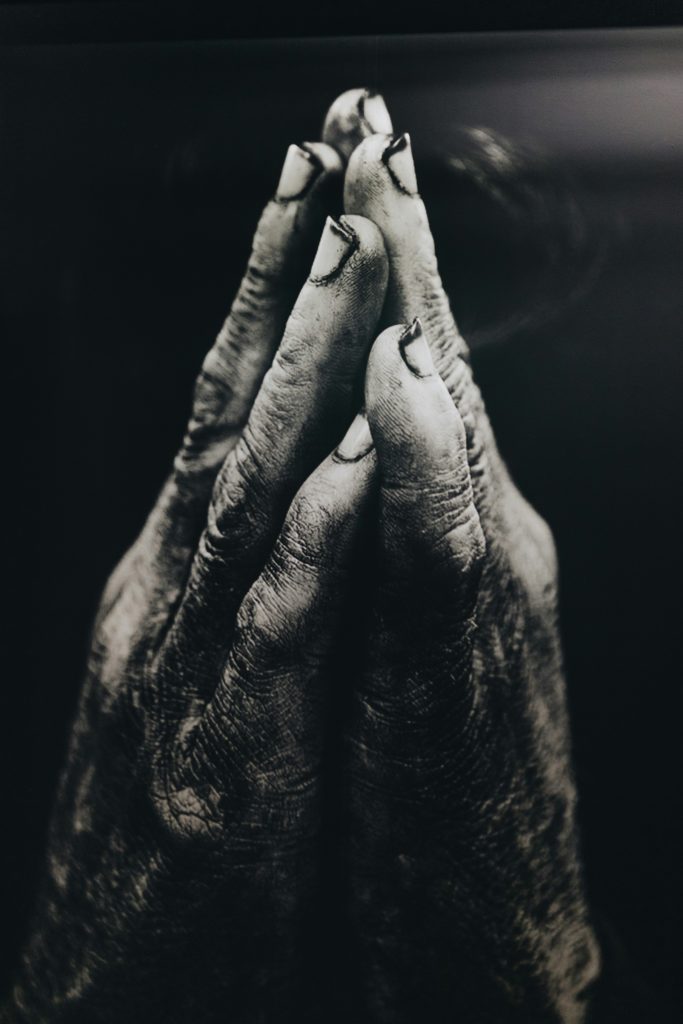
Morning prayer sparkles when the body is slow to stretch itself to honor this new day. The hand turns over the covers, summoned to wait for the revolution of the day to find a use again. Rejected, crumpled, they sag, overturned on the bed when the body stands up in the splendor of the dawning day. An eternal moment which reproduces itself as long as life flows through the veins and provides this breath whose absence rhymes with death. The body moves and embraces the darkness to slide on the mattress and let the feet touch the ground. Doesn't this ground wobble? Habit causes the room to become dark by denying it its mystery. The hand finds the pants and the sweater that will dress the clumsy body to regain movement when it had become accustomed to the stillness of the night. Suddenly, space has defined and precise volumes that are best not confronted with. Darkness watches over it so as not to lose its fortifications and hopes to regain some ground in its fight against daylight and against visual acuity which slowly adapts to the lack of light.
The corridor continues. It allows you to move towards the greatest adventure of the day. A few steps, and the corridor ends. The bathroom. A little bit of light. Very little. You have to wake up, but don't wake anyone. This meeting returns every morning around the world, intimate, without any display. The body discovers the dawning day, it leaves the night and its ocean of unconsciousness to bathe in the new source.
Finally, the prayer room. The little light that slides and reveals the triptych icon, a Virgin and Child, surrounded by the archangels Michael and Gabriel. A soft light like a setting Mediterranean sun. The kneeling descent on the prie-dieu reveals the moment of truth. Knees creak and beg for mercy. The muscular force deployed to descend onto the worn cushion placed on the wood of the prie-dieu allows the members to become familiar with this new position. Slouch while maintaining the dignity required by prayer. Let your gaze wander over the composite altar. Gaze at the woody light of the lamp on the cracked icon. See the face of Christ in this 19th century painting and his finger discreetly indicating his merciful heart. Recognizing the Trinity by Andrei Rublev. Think of the genius of Tarkovsky and all the fools-in-Christ. Let your mind wander like in an Antoine Blondin novel. Review this poorly signed contract, the chaos of work and human relations. Trying to ignore those creaky knees begging for comfort. Forget that phone call where each word sounded like a hammer blow. Let yourself be overcome by a few notes of despair about life after that horrible day the day before when all the work of several weeks was reduced to nothing. Regretting this fatigue which never ends and which longs to be swept away by a vacation which does not appear on the horizon... How so many thoughts turn and turn in the human skull which cannot stop tossing and cajoling its ideas, its concepts, this way of the world, the days past, those to come? What a marvel that these senses, all these visual or tactile or sound or taste or smell impressions come back and form the memory, where the spirit resides. What poetry!
The thoughts erase any pain from the knees or the osteoarthritis that sticks there like a shell to its rock. But, after the storm of memories and hopes, comes the time of hope and remembrance. It overflows memories and hopes by a hundred cubits, in depth, in length, in breadth, and in height. To tell the truth, it is very difficult to say how much it exceeds them, because there is nothing to compare them. The soul feels a wave of shock at the idea of this comparison. Nothing can be compared to hope and remembrance. It would be like comparing heaven to earth. That would not be appropriate. How can people who do not believe live like this, leaving out their souls? How can they cover them with so many artifices that they no longer resonate loudly enough to wake them? This is beyond comprehension.
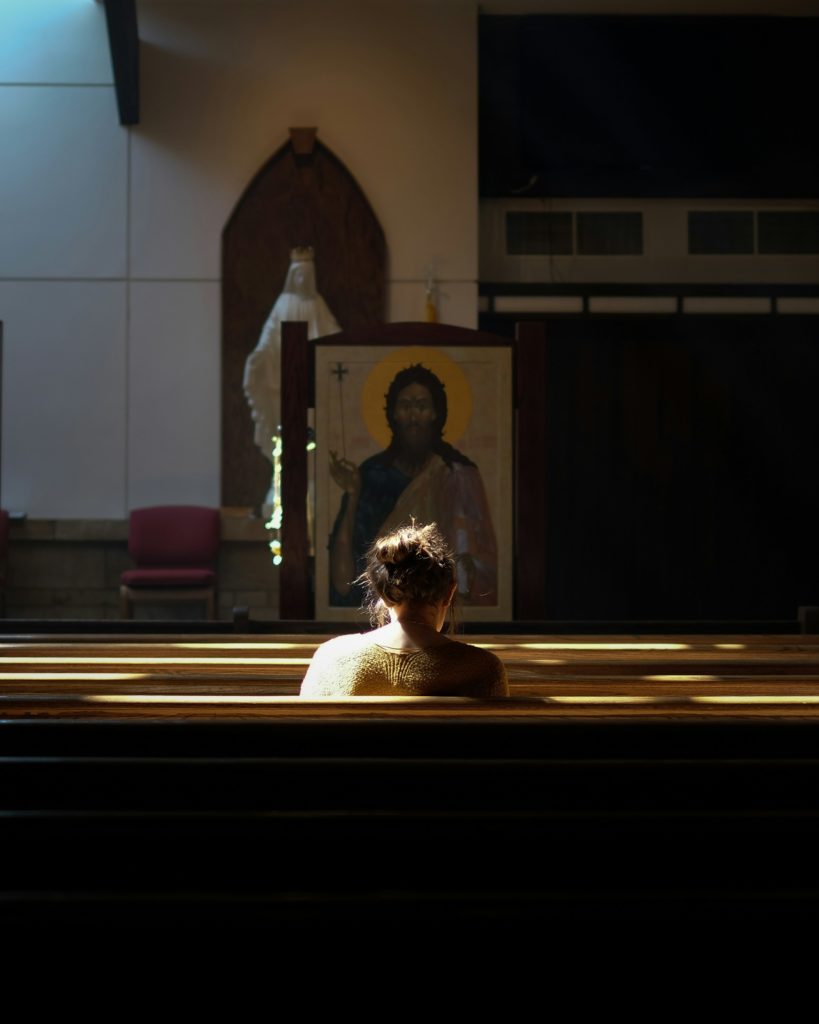
Oration sifts and sifts the first ideas. Those that resonate and descend into a bottomless cavern. The ones that continue to resonate when we no longer hear them. Ideas from beyond the grave which modify everyday life, which influence and deepen it. In what time and space is life expressed? We believe it here and it is there. We think of it as distant, absorbed in theory, and practice wins the vote by embracing thoughts and actions. We are absent to ourselves. So often. In such a meaningful way. Let's leave you alone. And, if we succeed, if we allow ourselves to be absorbed by this dawn which tramples and groans, which gives birth to day and life, love arrives without warning and envelops us and embraces us. It is the fruit of prayer. There is a provoked moment that awaits us in spite of ourselves. From this moment, no one comes back the same. A moment from which we never really return. The beauty of this hand-to-hand combat from which only love emerges victorious orders the world. We would thus like to avoid it, because there is no time, there is so much to do, the seconds ricochet off one another, the world commands us and we are victims of our crumbling structure.
Sometimes too, when the thoughts dissipate, the waiting brings us to despair. The appointment is missed. A participant is kept waiting. Yet the mind demands it. We wait and we get impatient. We would come to look at the time. We stamp our feet. Until the moment we realize that it is not the right place, that we have made a mistake, that we have gone astray. From experience, we should know that if the appointment does not take place, it is never His fault, but ours. We did not make ourselves available. The only time in our lives when we must be absent to attend.
Never has the creature revealed itself as much of a creature. All weaknesses displayed. All fragilities exposed. Nothing protects anymore, because nothing could tarnish the moment. The day that slips away and merges with the night light. The furtive shadows that slide across the face of the Virgin. The sword of Saint Michael which shines ready to serve. The zertsilo of the Archangel Gabriel where Christ is reflected, indicating the way always to come, to imitate. All these thoughts, these emotions, these feelings nourish and feed each other, mindful of their importance. No order governs them. The immensity of what they reveal and the smallness of their container frighten, but also captivate. Everything that has been said, what is going to be said, what has not been said, what could have been said, is concentrated and extracted to be reduced to nothing. The prayer has only just begun. She announces herself. The eyes close. We grope our way into ourselves. There is a sanctuary there that is worrying. Will we find what we are looking for? “Lord, in the silence of this dawning day, I come to ask you for peace, wisdom and strength…” You have to come looking for nothing to find every new thing there. The words suddenly agonize. They are no longer up to the task. The prayer begins. She extinguishes everything that is not her, the silence. The depth of silence. The abysmal intensity of silence. The silence that completes everything in its presence. The silence that reigns for its master: love. Then begins prayer, when love unfolds and fills every vein, every organ, every fiber of the being to establish the precedence of the Creator over the creature. Nothing else exists. The heart flooded with joy. Nothing else can exist, because everything is incongruous when compared to this moment, which is neither a feeling, nor an emotion, nor a thought. The universe diminishes and becomes shorter. There is a moment which does not exist, but which will recur at the next abandonment. This is a moment that gives life all its importance. There, at the heart of prayer vibrates love, a jewel that we all have, but not by escaping, by abandoning ourselves. Nothing is taken for granted, everything is offered. Little by little, by no longer having access to it, we convinced ourselves that it did not exist or that it no longer existed. He did not resist science, we found, this new religion. We even ridiculed him, because it was not enough to forget him, we had to denigrate him. However, whoever allows himself to be captured there, transforms there, metamorphoses there. To refuse is to die slowly. Die to Him. Forever.
Prayer influences all life that is offered there by restoring to it its simplicity, the marvelous.
What is the problem with the Mass of Paul VI?
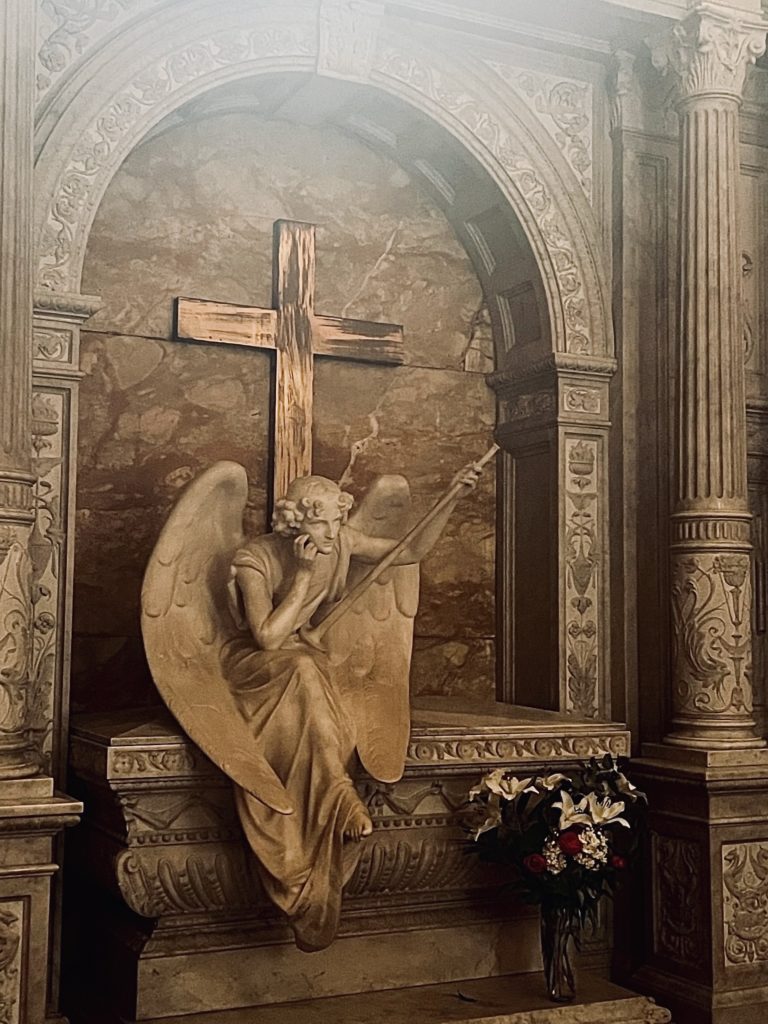 More than fifty years ago, the Catholic Church gave itself a new Mass which broke in a way never seen before with the tradition of the Church. The reformers, however, did not expect the traditional Mass to continue for them. They were even convinced of the contrary. abolition of the traditional Roman mass . commit themselves, as prayers, as seminarians, to celebrating and bringing to life this form of the Roman rite. The latter are often accused of being troublemakers, nostalgics, identity seekers, and above all, crime of lèse-majesté, of being against the Second Vatican Council, which one no longer separates from one's own spirit; this spirit of the council which we feast on without ever really qualifying it, as for almost all important things. In the Church as elsewhere, progressives act by essentializing their opponents in order to discredit them. The liturgy is the summit and the source of the life of the Church, as the last council reminds us, and the liturgy is tradition. To resolve the crisis of the liturgy that she carries within her, the Church will have to reweave the threads of damaged and wounded tradition, even and above all, if the time urges her not to do so.
More than fifty years ago, the Catholic Church gave itself a new Mass which broke in a way never seen before with the tradition of the Church. The reformers, however, did not expect the traditional Mass to continue for them. They were even convinced of the contrary. abolition of the traditional Roman mass . commit themselves, as prayers, as seminarians, to celebrating and bringing to life this form of the Roman rite. The latter are often accused of being troublemakers, nostalgics, identity seekers, and above all, crime of lèse-majesté, of being against the Second Vatican Council, which one no longer separates from one's own spirit; this spirit of the council which we feast on without ever really qualifying it, as for almost all important things. In the Church as elsewhere, progressives act by essentializing their opponents in order to discredit them. The liturgy is the summit and the source of the life of the Church, as the last council reminds us, and the liturgy is tradition. To resolve the crisis of the liturgy that she carries within her, the Church will have to reweave the threads of damaged and wounded tradition, even and above all, if the time urges her not to do so.
Which Vatican II?
"The new Ordo Missae, if we consider the new elements, susceptible to very different appreciations, which seem implied or implied therein, departs in an impressive way, as a whole as in detail, from the theology of the Holy Mass, as it was formulated at the XXII session of the Council of Trent, which, by definitively fixing the "canons" of the rite, raised an impassable barrier against any heresy which could undermine the integrity of the Mystery” 2 Cardinal Ottaviani, prefect emeritus of the Congregation for the Doctrine of the Faith addressed Paul VI on September 3, 1969, we were a few weeks away from the entry into force of the new mass. In a way, this concluded the Second Vatican Council which had however closed its doors for four years! Let's dwell a little on the figure of Cardinal Alfredo Ottaviani: the son of a baker, from the poor neighborhoods of Rome, he turned out to be a very good student at the Roman pontifical seminary, and obtained three doctorates, in theology, philosophy and canon law. . Secretary of the Holy Office, then proprefect of the Congregation for the Doctrine of the Faith, he worked the four years preceding the council to prepare the themes to be treated and pronounced the habemus papam for the election of John XXIII. This month of October 1962 will see the masks fall and positions, progressive or modernist, appear. John XXIII, in his opening speech of the Council, will display a certain contempt for the curial team of Pius XII by declaring: "The Spouse of Christ prefers to resort to the remedy of mercy, rather than brandishing the weapons of severity . She believes that, rather than condemning, she responds better to the needs of our time, by emphasizing the riches of her doctrine. » 3 There is in this sentence a dichotomy which inaugurates and prefigures the whole Second Vatican Council: can there be mercy if there is no condemnation of an act? Why should there be a remedy if there is no wound before? Didn't we see the will to put sin under the rug like a troublesome dust? The tone used where leniency asserts itself as the supreme authority will become the leitmotif of the Second Vatican Council. Therefore a sling is organized. The texts prepared by the curia are rejected. Notably De fontibus revelationis , on the sources of revelation, and De Ecclesia . An absolute majority was needed to ratify this rejection, John XXIII gave his agreement and was satisfied with the relative majority. “Thus was carried out a veritable coup d'etat, by which all the liberal tendencies, in the process of organizing themselves into a 'conciliar majority', snatched doctrinal power from the Curia inherited from Pius XII. » 4 . From then on, and since the working texts had been trampled on and discarded, work began on the liturgy. We thought the unifying subject. The progressives had an agenda as usual, which the conservatives almost never have. Cardinal Ottaviani, on October 30, 1962, took the floor, he was not yet blind and was going to show clairvoyance, he asked that the rite of the Mass not be treated "like a piece of cloth that is put back fashionable according to the fancy of each generation”. It seemed to the audience that it was too long in its development. He was interrupted without regard to his rank. His microphone was cut to the applause of a large number of Fathers. The Second Vatican Council could begin.
Read more about “What is the problem with the Mass of Paul VI?”
Letter to Pope Francis regarding the Mass
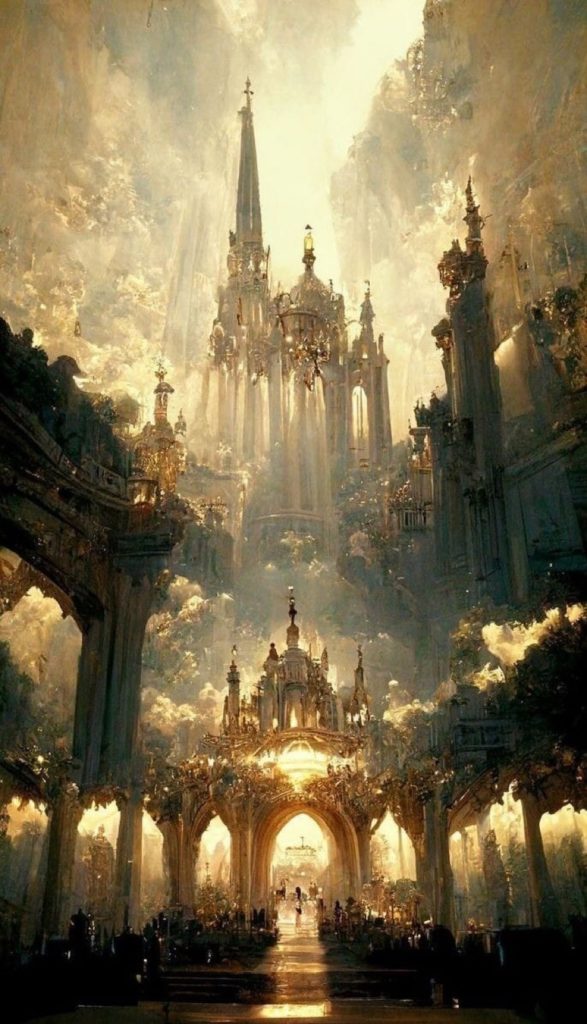
Preamble
This letter to Pope Francis was first written for La Voie Romaine 1 in order to bear witness to the beauty and effectiveness of the traditional Roman rite and to bear witness to the shock caused by the motu proprio, Traditionis custodes , published on 16 July 2021 by Pope Francis.
Holy Father,
I was waking up from a terrible nightmare: I dreamed that you were limiting access to the traditional liturgy, so I thought it was important to reveal to you how much the Mass of Saint Pius V has marked my existence without my being the least prepared for it. Do you know that it is difficult for me to write Saint-Père, because I had no father. I have one, like everyone else, but I didn't get it when I should have. So he left me before I was born. I found it later, but you understand that I didn't get it at the right time. I didn't have the good times that a child knows with his father. I didn't know him when the need arose, and the need arose at all times since absence created it I didn't have a father to guide me, like a tutor, to share my likes and my dislikes, to marry my views or influence them.
Continue reading “Letter to Pope Francis regarding the Mass”
The breath of the Spirit in Warrington! A church is reborn!
The Fraternity at Warrington , by Abbé Armand de Malleray, Rector of St. Mary's Church in Warrington
 Few traditional mass centers have started without a core of parishioners willing to pray in the traditional form. Yet this is what happened in Sainte Marie de Warrington, a medium-sized town located between Liverpool and Manchester, in the northwest of England. The Benedictine monks of Ampleforth Abbey had built this large and beautiful neo-Gothic church in 1870. But for lack of vocations they had to entrust Saint Mary to the diocese which, for the same reason, soon had only one alternative. : closure or Fraternité Saint-Pierre. One could thus summarize the choice offered by the Archbishop of Liverpool to his flock: Eleison or Morrison (Morrison is the English equivalent of Leclerc supermarkets). Rather than let their beautiful church become a shopping center (or an indoor climbing center as happened for another church in the city), the faithful decided to try the Mass in Latin. In 2015, the Priestly Fraternity of Saint Peter was therefore invited to take over the management of this church.
Few traditional mass centers have started without a core of parishioners willing to pray in the traditional form. Yet this is what happened in Sainte Marie de Warrington, a medium-sized town located between Liverpool and Manchester, in the northwest of England. The Benedictine monks of Ampleforth Abbey had built this large and beautiful neo-Gothic church in 1870. But for lack of vocations they had to entrust Saint Mary to the diocese which, for the same reason, soon had only one alternative. : closure or Fraternité Saint-Pierre. One could thus summarize the choice offered by the Archbishop of Liverpool to his flock: Eleison or Morrison (Morrison is the English equivalent of Leclerc supermarkets). Rather than let their beautiful church become a shopping center (or an indoor climbing center as happened for another church in the city), the faithful decided to try the Mass in Latin. In 2015, the Priestly Fraternity of Saint Peter was therefore invited to take over the management of this church.
In this majestic architectural setting, we were able to unfold the traditional liturgy and ministry without the slightest hindrance. As all the buildings belong to us, and with the approval of the local archbishop, the entire ministry is carried out according to the liturgical and disciplinary traditions described in the Constitutions of the FSSP. Before our arrival, and in the first months, several meetings allowed parishioners to ask questions to which our priests answered, explaining the theological and spiritual reasons for Latin, the posture of the priest turned towards God, the absence of lay ministers of Holy Communion etc. About three quarters of the community remained. Since then, many other devotees have arrived. For many, the first Holy Week in 2016 was a revelation. Other parishioners said they discovered the significance of the sacred architecture, converging on the tabernacle, when the vast platform with table installed in the middle of the nave in the 1970s was removed and the high altar rebuilt. After about 50 years of interruption, we have restored the Corpus Christi procession of Saint Mary to a nearby church. All Catholics in the city and elsewhere are invited. We bought a large adjacent building to make a small school and a large parish hall. About 40 people attend Holy Mass each weekday and 240 on Sundays. The priests absolve about 85 penitents a week and give plenty of time for spiritual direction.
As all the buildings belong to us, and with the approval of the local archbishop, the entire ministry is carried out according to the liturgical and disciplinary traditions described in the Constitutions of the FSSP. Before our arrival, and in the first months, several meetings allowed parishioners to ask questions to which our priests answered, explaining the theological and spiritual reasons for Latin, the posture of the priest turned towards God, the absence of lay ministers of Holy Communion etc. About three quarters of the community remained. Since then, many other devotees have arrived. For many, the first Holy Week in 2016 was a revelation. Other parishioners said they discovered the significance of the sacred architecture, converging on the tabernacle, when the vast platform with table installed in the middle of the nave in the 1970s was removed and the high altar rebuilt. After about 50 years of interruption, we have restored the Corpus Christi procession of Saint Mary to a nearby church. All Catholics in the city and elsewhere are invited. We bought a large adjacent building to make a small school and a large parish hall. About 40 people attend Holy Mass each weekday and 240 on Sundays. The priests absolve about 85 penitents a week and give plenty of time for spiritual direction.
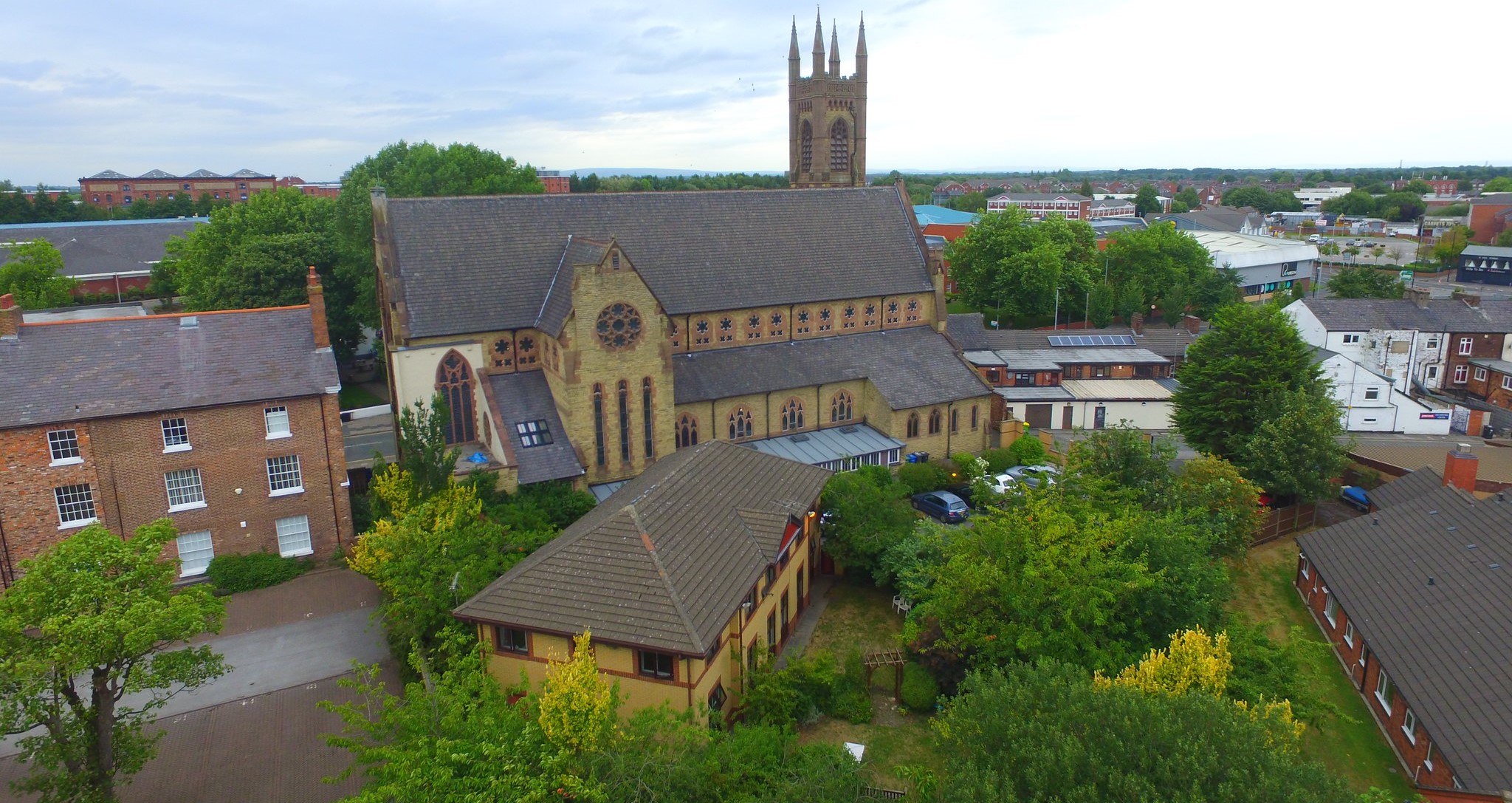
The Archbishop of Liverpool has given us unwavering support.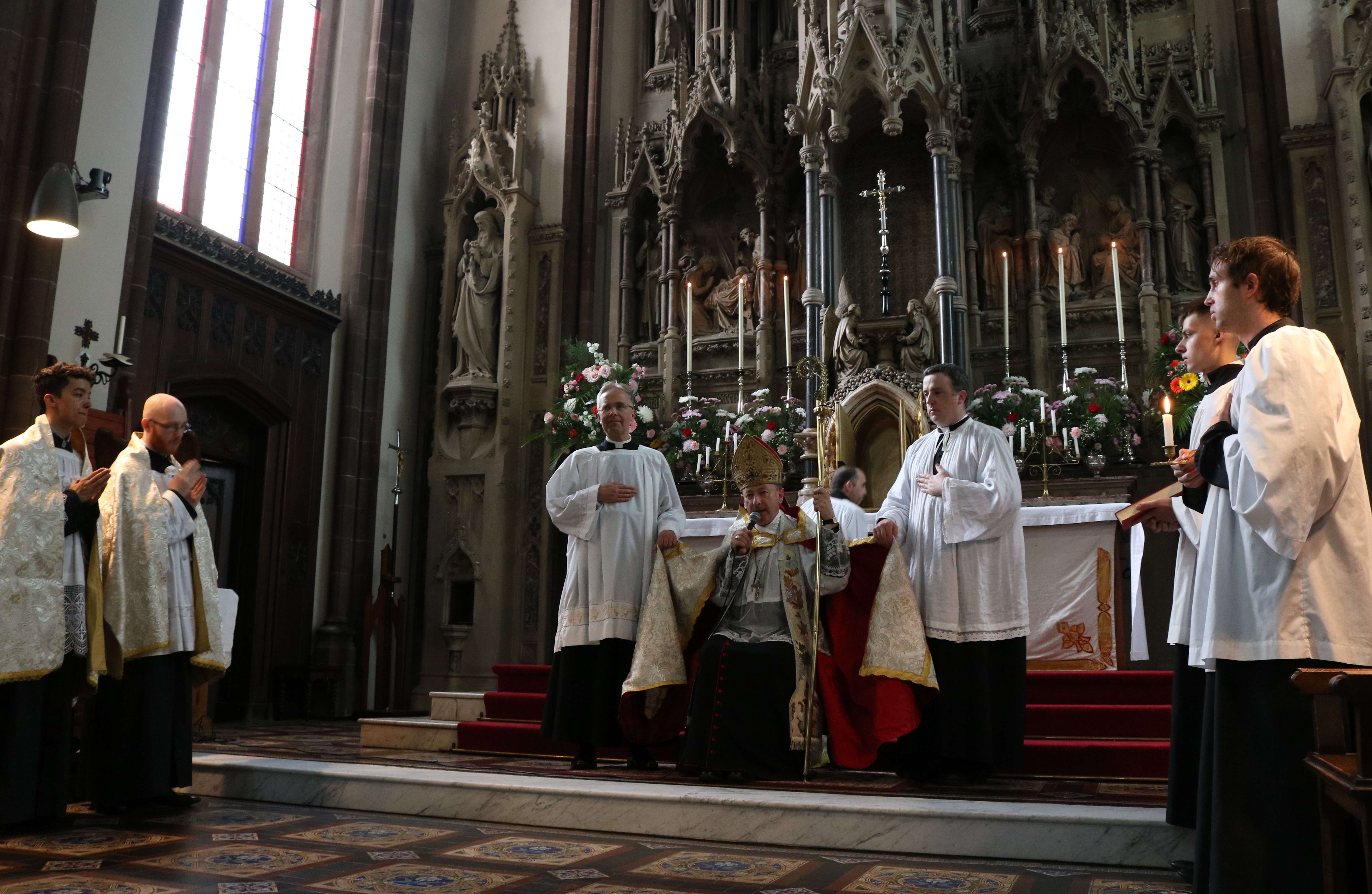 Twice he ordained our priests in our church. He was the first English bishop to ordain in the traditional form since 1970. Each year he confers the Sacrament of Confirmation. Without however sharing the point of view of our Fraternity on a certain number of pastoral and dogmatic questions, our Archbishop is happy to see a community of faithful growing in a serene way. While burying far more priests than he ordains, and closing churches instead of building them, the pastor of this archdiocese generously supports our little community because of the manifest fruits God is producing in it. Every year converts join the Church, young people marry and others embrace the consecrated life. The faithful often pray for vocations, either during votive Masses for Vocations, or according to the Prayer of the Confraternity of Saint Peter. Their clergy remind them that their prayers and their sacrifices are essential to obtain from God the priests of tomorrow, making it possible to offer other parishes the opportunity for a saving rebound like that of Saint Mary of Warrington. O God, give us many holy priests!
Twice he ordained our priests in our church. He was the first English bishop to ordain in the traditional form since 1970. Each year he confers the Sacrament of Confirmation. Without however sharing the point of view of our Fraternity on a certain number of pastoral and dogmatic questions, our Archbishop is happy to see a community of faithful growing in a serene way. While burying far more priests than he ordains, and closing churches instead of building them, the pastor of this archdiocese generously supports our little community because of the manifest fruits God is producing in it. Every year converts join the Church, young people marry and others embrace the consecrated life. The faithful often pray for vocations, either during votive Masses for Vocations, or according to the Prayer of the Confraternity of Saint Peter. Their clergy remind them that their prayers and their sacrifices are essential to obtain from God the priests of tomorrow, making it possible to offer other parishes the opportunity for a saving rebound like that of Saint Mary of Warrington. O God, give us many holy priests!
Learn Gregorian Chant
It was in June 1985, in Pont-à-Mousson, at the end of the symposium “Music in the Church today”. Maurice Fleuret — in peace be his soul — Minister Jack Lang's magnificent director of music and dance, took the floor. Word of fire. Of supplication; one can say so, since he himself begged. I will quote him ad sensum, but this word I have never forgotten: it is his. Evoking what Western music, from its origins to the present day, owed to the Church, to the liturgy of the Church, what owed to the music of the Church the music of Monteverdi, Bach, Mozart , Beethoven, Stravinsky, Messiaen: everything . To the liturgical music of the Church, Western music owed everything, he said. And himself, Maurice Fleuret, in his own life as a musician, to the music of the Church, what did he owe? Everything . He owed her everything, he said. And this Western music which owed everything to the Church, to the liturgy of the Church, what did it owe to Gregorian chant? Everything , he said. To Gregorian chant, all Western music, he said, owed everything . But the Spirit of Gregorian chant, he said, this spirit which he could not imagine ceasing to breathe, where was it breathed? In the liturgy, he says. And that's when he begged the Church…: I beg you, he exclaimed, for the benefit of the ecclesiastics present, don't leave the monopoly of Gregorian chant to the State. It is made for the liturgy. And it is in the liturgy that it must be practiced.”
Even if the Gregorian is sung less (when Vatican II recommended it as the major chant of the liturgy, go figure), it remains the treasure of Europe. Maurice Fleuret, pupil of Olivier Messiaen and minister of Jack Lang, recalled it precisely above. The Gregorian was omitted by those who promulgated it, so it is difficult to see clearly. Those who take the time to go on retreat in monasteries or who, out of taste, listen to Gregorian chant know that it wins over believers and non-believers alike. The Gregorian turns out to be unclassifiable. Rooted and distant, powerful and delicate, humble and solemn, fragile and vigorous. Brother Toussaint, former monk of the Sainte Madeleine du Barroux abbey, now a hermit, offers Gregorian courses à la carte and whatever your level. He is an excellent teacher, and I can attest to that!
Brother Toussaint offers you very flexible formulas. You can follow the courses remotely or come on site (the Saint-Bède hermitage is located between Lyon and Grenoble). For the moment, he cannot yet accommodate anyone, even if in the long term he would like to build a small hostelry to receive guests... There are accommodations not very far from the hermitage. Anyone who knew Barroux in its early days knows the secret but avowed desire of Brother Toussaint to recreate this unique atmosphere and to receive a few guests to immerse them in almost perpetual prayer. In the immediate future, it is a good idea to start by learning to sing, which gives Brother Toussaint time to find the funds to increase his structure (patrons are welcome here!). The prices are decreasing if you come with several people. One hour, three days, all formulas are possible. Brother Toussaint will gladly come out of his eremitism to teach you the art of Gregorian chant.
Information: Learn Gregorian chant with a Benedictine monk
Reservations: https://frere-toussaint.reservio.com/
And the complete site where you can discover Brother Toussaint's articles on eremitism: https://www.ermites-saint-benoit.com/
The Pump by Clive Staples Lewis
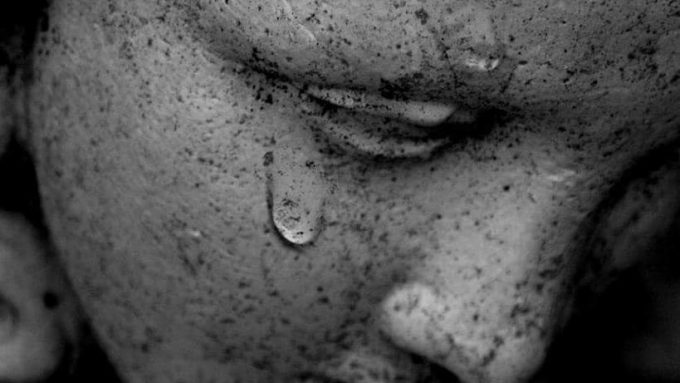
"In the first place, you must get rid of that nauseating idea, the fruit of an inferiority complex manifesto and a worldly mind, that pomp, in the right circumstances, has anything in common with vanity or sufficiency. A celebrant who solemnly approaches the altar to celebrate, a princess led by her king in a noble and delicate minuet, a senior officer reviewing the honored troops during a parade, a butler in livery bringing food lavish at a Christmas banquet — all wear unusual attire and move with calculated and impeccable dignity. This does not mean that their gestures are in vain, rather docile; their gestures obey an imperative that presides over every solemnity. The modern habit of practicing ceremonies without any etiquette is no proof of humility; rather, it proves the powerless celebrant's inability to forget himself in the service, and his readiness to rush and spoil the pleasure proper to the ritual of placing beauty at the center of the world and making it accessible to him. »
Free translation by the blog author.
Lauda Zion
Magnificent sequence in the Mass of Corpus Christi, written by Saint Thomas Aquinas, this dogmatic poetry praises the new and true Sion, the Church. Benoit XVI said of this Mass: “These are texts that make the waves of the heart vibrate, while the intelligence, penetrating with wonder into the mystery, recognizes in the Eucharist the living and true presence of Jesus, of his Sacrifice of love that reconciles us to the Father and gives us salvation.”
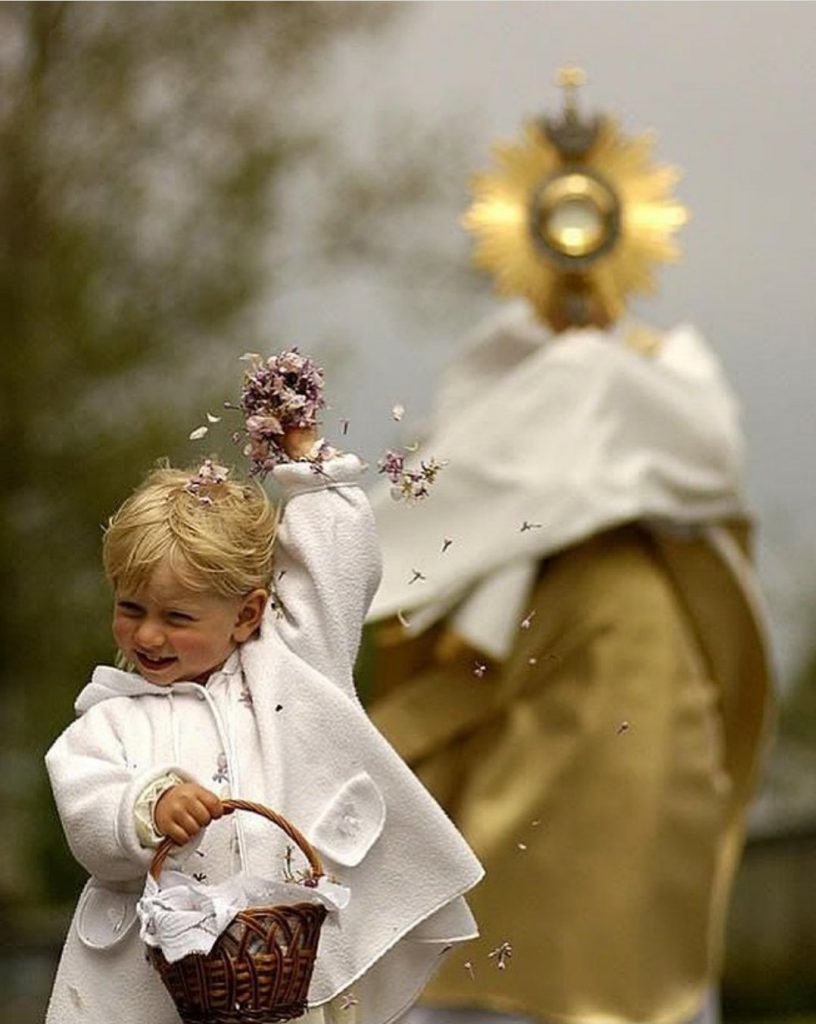
Praise, Sion, your saviour, praise your leader and your pastor, with hymns and canticles.
As much as you can, dare to sing it, because it exceeds all praise, and you are not enough to praise it.
A special subject of praise is proposed to us today: it is the living and life-giving bread.
The bread that at the meal of the Holy Communion, Jesus really gave to the troop of the twelve brothers.
Let the praise be full and sonorous;
may it be joyful and beautiful, the jubilation of the soul. For today is the solemnity that recalls the first institution of this Supper.
At this table of the new King, the new Passover of the new law ends the ancient Passover.
The old rite is chased away by the new, the shadow by the truth;
the light dissipates the night. What Christ did at the Last Supper, he ordered to be done in memory of him.
Instructed by his holy orders, we consecrate the bread and the wine in the host of salvation.
It is a dogma given to Christians that bread becomes flesh and wine becomes meaning.
What you do not understand or see, living faith attests against the course of events.
Beneath various appearances, simple signs and non-realities, hide sublime realities.
The flesh is food, the blood drink;
however Christ remains whole on one and the other species. By whoever receives it, it is not broken or broken or divided, but received whole.
Only one receives it, a thousand receive it: each as much as the others;
taken as food, it is not destroyed. The good guys take it, the bad guys take it, but for a different fate: Life or death!
Death for the wicked, life for the good: see how different the outcome is from the same take.
If finally the sacrament is broken, do not be troubled, but remember that there is under each particle as much as the whole covers.
No scission of reality occurs: of the sign alone there is a rupture, and it diminishes neither the state nor the magnitude of the reality signified.
Here is the bread of the angels which has become food for travellers: it is truly the bread of children, which must not be thrown to the dog.
It is signified in advance by figures: the immolation of Isaac, the lamb set apart for the passover, the manna given to our fathers.
Good Shepherd, true bread, Jesus, have mercy on us: feed us, keep us, show us the real good in the land of the living.
You who know and can do everything, who feed here below the mortals that we are: make us up there your commensals, the co-heirs and the companions of the holy citizens of heaven.
Pentecost happiness

One of the joys of the octave of Pentecost lies in the recitation of the Veni, Sancte Spiritus , after the recitation of the Victimae Paschali during Easter week, the liturgy never ceases to amaze us.
Come, Holy Spirit,
And send from the sky
A ray of your light.
Come, father of the poor,
Come, giver of gifts,
Come, light of hearts.
Very good comforter,
Sweet host of the soul,
Sweet refreshment.
Rest in work,
Relief in the heat,
Consolation in tears.
O blessed light,
Fill to the most intimate
The hearts of your faithful.
Without your divine help,
There is nothing in man,
It is nothing innocent.
Wash away what is soiled,
Water what is arid,
Heal what is hurt.
Soften what is stiff,
Warm what is cold,
Straighten out what is wrong.
Give to your followers
who trust in you,
The Seven Sacred Gifts.
Give the merit of virtue,
Give the final salute,
Give eternal joy.
So be it. Alleluia.
Craftsman's Prayer
12th century monastic prayer
Teach me, Lord, to use the time you give me to work well…
Teach me to unite haste and slowness, serenity and fervor, zeal and peace. Help me at the start of the work. Help me in the heart of the work… And above all fill up the gaps in my work yourself: Lord, in all the work of my hands leave a grace from You to speak to others and a defect from me to speak myself.Keep in me the hope of perfection, otherwise I would lose heart. Keep me in the impotence of perfection, otherwise I would lose myself in pride...
Lord, never let me forget that all work is empty except where there is love...
Lord, teach me to pray with my hands, my arms and all my strength. Remind me that the work of my hands belongs to you and that it is up to me to give it back to you… That if I do to please others, like the flower of the grass I will wither in the evening. But if I do for the sake of good, I will remain in good. And the time to do well and to your glory is now.
Amen